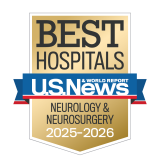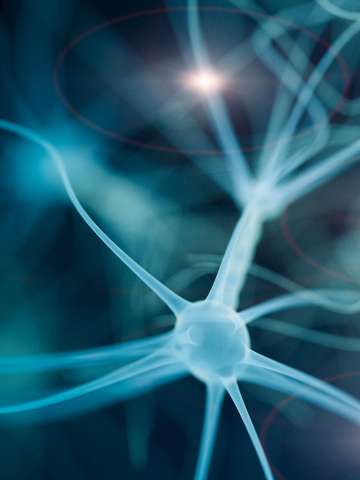Neurology
Neurologists at UCLA Health offer specialized care that consistently ranks among the best in the country.


Why choose UCLA Health for neurology?
Our neurologists provide expert patient care, conduct leading-edge research and teach the next generation of clinicians and researchers.
Our Neurology and Neurosurgery Programs are consistently ranked among the best in Los Angeles and the nation, according to U.S. News & World Report. When you choose UCLA Health for neurology services, you benefit from:
Nationally recognized experts: Our scientists and clinicians have been ranked 1st or 2nd in National Institutes of Health (NIH) funding since 2002. This status means we lead multiple research studies each year in neurology. Our faculty teach courses at national meetings, author textbooks on neurology subspecialties, and are well-known nationally and internationally.
Advanced care options: Our 26-bed neurological intensive care unit (ICU) is the only neuro ICU in the world that has sophisticated diagnostic technology on-site. Having this technology means we can monitor conditions including ischemic stroke, traumatic brain injury (TBI) and cerebral hemorrhage in real-time. With this capability, patients who are too unstable to move still have access to the most advanced imaging.
Commitment to growth: Our neurologists serve as faculty at the David Geffen School of Medicine at UCLA. They are dedicated to teaching and training residents and fellows. This commitment means our specialists continually learn about the newest, best treatments to teach the upcoming generation of neurology leaders.
Subspecialty expertise: Many of our neurologists have specialized training in niche areas of neurology diseases and conditions. Because these experts have advanced, subspecialty training, we can offer even more targeted treatments.
Convenient locations: Our neurologists practice at several outpatient locations throughout the greater Los Angeles region. This means you can access expert neurology care close to home.
Our neurology services
We use a model that combines general neurology services and subspecialty clinics. Our neurology services include:
General neurology programs
We comprehensively treat all types of general neurology conditions. Areas of care include:
- Behavioral Neurology Program: This program focuses on neurocognitive disorders such as Alzheimer’s disease, dementia and other progressive cognitive problems.
- Goldberg Migraine Program: Experts in the Migraine Program diagnose, treat and manage all types of headache disorders.
- Sleep Disorders Clinic: In this outpatient clinic, specialists diagnose and treat sleep disorders.
- Comprehensive Stroke Center : Our renowned UCLA Stroke Center provides comprehensive diagnostic and therapeutic care to patients with disorders of the brain and spinal cord. It is home to one of the nation’s first dedicated inpatient stroke units. The Stroke Center is also the first and only stroke center in Los Angeles County certified by The Joint Commission. This certification means we have specialists available 24/7 for immediate care, diagnosis, treatment and follow-up rehabilitation for all types of stroke.
Movement and neuromuscular programs
Movement and neuromuscular disorders can affect every aspect of your life. Our neurologists provide treatment for specific conditions through specialized programs, including:
- Movement Disorders Program: A multidisciplinary team of specialists treats patients with Parkinson’s disease, tremors, tics, Tourette syndrome and other movement disorders.
- Multiple Sclerosis (MS) Program: A team of dedicated experts provides life-changing clinical care while conducting research to advance MS treatment.
- Marilyn Hilton MS Achievement Center: This unique program provides education that empowers people with MS to take control of their health and well-being. We offer these services in collaboration with the Southern California and Nevada Chapter of the National Multiple Sclerosis Society.
- Neuromuscular Program: We have a range of specialty neuromuscular clinics, whether you have an undiagnosed condition, nerve damage, muscular dystrophy or amyotrophic lateral sclerosis (ALS).
Additional subspecialty programs
Many of our neurologists have advanced subspecialty expertise. This niche training means we can offer even more advanced treatments in our subspecialty programs. Programs we offer include:
- Epilepsy Program: Our specialists treat patients from all over the world. We conduct investigative research to treat the most complex adult epilepsy.
- Neurocritical Care Program: We provide the highest quality critical care to patients with life-threatening neurologic conditions. We have a Level I TBI Center and our 24-bed Neurocritical Care Unit provides advanced care for critically ill patients.
- Neuro-infectious Diseases Program: Our experts provide assessments and second opinions about the neurological effects of chronic infectious disease, such as HIV/AIDS or hepatitis C.
- Neuro-oncology Program: Neurosurgery, neuroradiology, neuropathology and radiation oncology experts collaborate to provide comprehensive brain tumor treatment.
- Neuro-Otology Program: Neurotologists study and treat patients with dizziness, vertigo, balance disorders or tinnitus.
- Neurorehabilitation Program: A dedicated team of neurorehabilitation specialists ensures that you achieve the highest quality of life with a neurologic condition.
Research centers
Research is a crucial part of our division. For more than 20 years, our neurologists have been instrumental in moving the field of neurology forward through research. Research centers include:
- Clinical Neurogenomics Research Center: This center allows our clinicians to compile and use an informational database to conduct research and find the best treatments.
- Mary S. Eaton Center for Alzheimer’s Disease Research: In this center, we provide comprehensive diagnosis and management of dementia and Alzheimer’s disease, including access to clinical trials.
- Neurophysiology research: Our clinicians conduct studies to help us better understand cerebral blood flow, epilepsy treatment, seizure disorders, narcolepsy and more.
Conditions we treat
Our neurologists treat a wide array of neurology concerns. Common conditions we treat include:
- ALS: A progressive disease that affects the nerve cells in the brain and spinal cord.
- Alzheimer’s disease: A brain disorder that progressively destroys memory, thinking skills and other important cognitive functions.
- Epilepsy: A brain disorder that causes recurring, unprovoked seizures.
- Migraines: A neurological condition that causes severe headaches, often accompanied by head throbbing, nausea or sensitivity to light.
- Multiple sclerosis: A chronic disease where your immune system attacks the protective coverings over your nerves, leading to pain, fatigue and impaired coordination.
- Parkinson’s disease: A progressive brain disorder that leads to shaking, stiffness and loss of balance.
- Stroke: A sudden interruption of the blood supply in your brain.
Tests and procedures we offer
Many nervous system disorders can cause similar symptoms, so it’s crucial that we make a correct finding. We use advanced tools and tests to ensure you receive a detailed, accurate diagnosis.
Common tests we use include:
- CT scans: This test uses a combination of X-rays and computer technology to create detailed images of the inside of your body.
- Electroencephalogram (EEG): EEGs are an essential tool in epilepsy diagnosis. During an EEG, we attach electrodes to your scalp to record your brain’s electrical activity.
- Electromyography (EMG): During an EMG, we place electrodes over certain muscle groups to evaluate your muscle and motor functions.
- MRI: MRIs use a combination of radio waves, magnets and computer technology to create detailed images of your body.
- Positron emission tomography (PET): During a PET scan, you take a safe radioactive drug, then we take images of your body. The drug collects in areas of your body where there is disease. It can help us diagnose tumors, seizures or Alzheimer’s disease.
- Spinal tap: During a spinal tap, we insert a needle into your low back and take a small sample of your cerebrospinal fluid (CSF). CSF is the fluid that cushions the brain and spinal cord. Testing CSF can tell us about infections, tumors or other brain disorders.
- Ultrasound (sonography): We use high-frequency sound waves to look at your internal organs. We can also use ultrasound to evaluate your blood flow.
Our expert neurology team
Our neurologists are leaders in clinical care, research and education. We consistently rank among the top programs in the nation with some of the highest research funding from the NIH. Many of our doctors have subspecialty expertise, which leads to even more advanced, targeted treatments.
Contact us
Call 310-825-2631 to request an appointment with a neurologist at UCLA Health.
Find Your Care
Our neurology team consistently ranks among the best in the country. To find out more about our neurology services, call 310-794-1195.
